Kerry James Marshall: Mastry
April 23, 2016 through September 25, 2016
Museum of Contemporary Art Chicago
220 East Chicago Avenue
Chicago, Illinois 60611
Kerry James Marshall has been on my radar since my arrival to Chicago in 1993. He’s always loomed large and his current exhibition Kerry James Marshall: Mastry at the MCA echoes the artist’s ongoing relevance. Co-organized with the Metropolitan Museum of Art, New York, and The Museum of Contemporary Art, Los Angeles, this first retrospective does nothing short of reaffirming Marshall as one of the countries most important living artists. I was fortunate to attend one of the small press previews for this seminal enterprise where Marshall and former Manilow Senior Curator Dieter Roelstraete offered candid insight in an informal conversation while traversing the exhibition’s galleries. In flowing dialogue, Marshall discussed the absence of the African-American voice in art history, the process of history painting, meditations on personal experience, and the importance of understanding one’s uniqueness. Simply put, Marshall’s level of engagement (here and in studio) is not something encountered often enough in today’s society. The experience was one that certainly will not be soon forgotten.
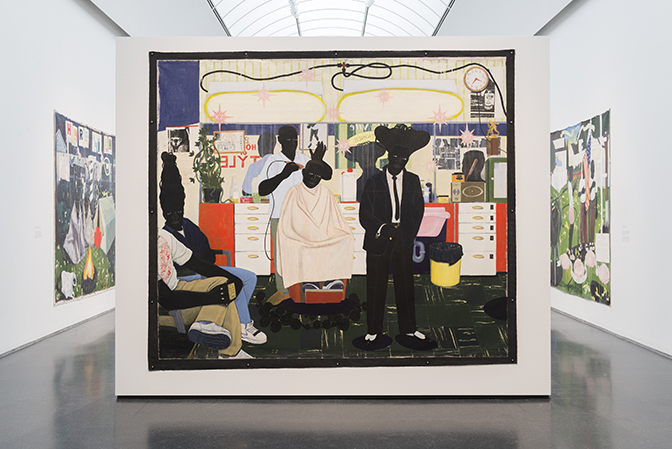
Installation view, Kerry James Marshall: Mastry, MCA Chicago, April 23–September 25, 2016.
Photo: Nathan Keay, © MCA Chicago.
I’m fascinated with the confidence and ease that Marshall holds when discussing his upbringing in Mobile, Alabama, and his childhood in the Watts neighborhood of Los Angeles. Having been born prior to the passage of the Civil Rights Act and experiencing the 1965 Watts Riots first-hand, Marshall could have easily developed an antagonistic voice within his aesthetic practice. However, in conversation he noted his disinterest in portraying violence and the importance of transcending adversity via antithetical means to those that often drag large swaths of our society down. Marshall is a graceful and deliberate conversationalist that understands the balance needed to maintain his audience’s attention. Marshall’s intimate stories centered upon the most quotidian of African-American activities were refreshing in a time where Chicago sees far to many young people of color dying in the city’s south and west side neighborhoods of Englewood and Austin.
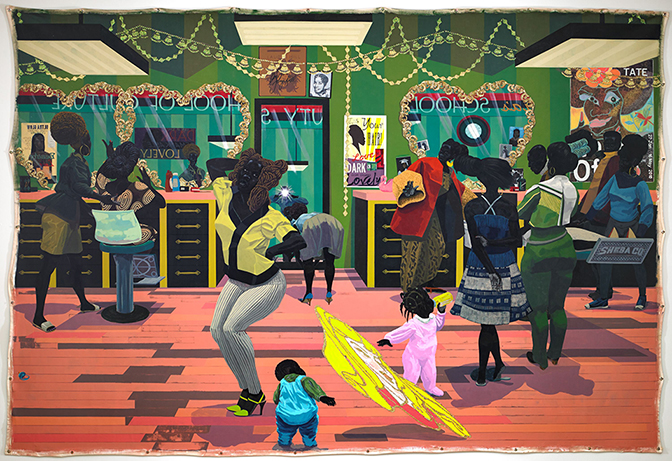
Kerry James Marshall, School of Beauty, School of Culture, 2012. Collection of the Birmingham Museum of Art; Museum purchase with funds provided by Elizabeth (Bibby) Smith, the Collectors Circle for Contemporary Art, Jane Comer, the Sankofa Society, and general acquisition funds. Photo: Sean Pathasema.
Kerry James Marshall: Mastry is one of those exhibitions that requires multiple viewings. This is due as much to the scale of the exhibit as to the layering of narratives and symbolism found in the paintings. For instance, in School of Beauty, School of Culture, 2012, one encounters a lesson in the history of art inside the active setting of an African-American beauty parlor. Complete with diva at center in full pose flanked by two toddlers, there are nods to Marshall’s contemporaries (e.g., Chris Ofili-esque imagery in the upper right) contrasted with visual strategies developed in masterworks like Hans Holbien the Younger’s Ambassadors, 1533. There is an anamorphic image placed in central foreground of what appears to be one of Disney’s cartoon princess. Throughout Marshall’s paintings one is confronted with evolving social constructs that redefine definitions of beauty through the inclusion of an African-American voice.
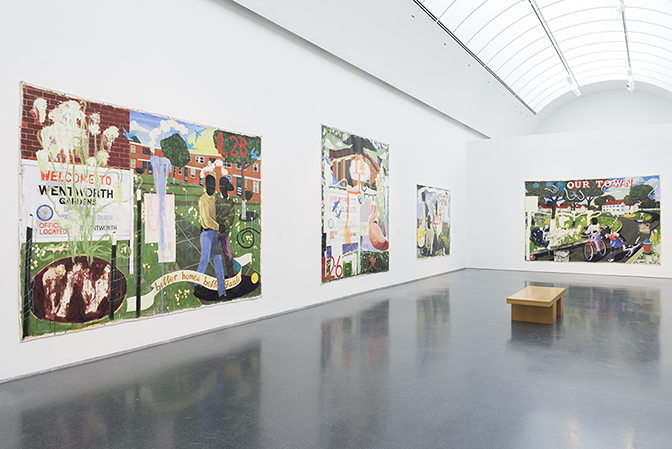
Installation view, Kerry James Marshall: Mastry, MCA Chicago, April 23–September 25, 2016.
Photo: Nathan Keay, © MCA Chicago.
Another point I’ve kept revisiting during viewings centers upon Marshall’s persistent compassionate focus. There are works offering insight into the affectionate encounters connected with familial love, active interior views of contemporary daily activities, portraits of significant black figures, and reminders of our country’s nefarious association with slavery. Through the darkest to enlightening of topics, Marshall’s solicitous approach allows the viewer to submerge themselves into the narrative and visual experience in a way that affords time for reflective contemplation. This can be seen in Souvenir I, 1997. There is a pervasive sadness in this painting. A single figure with angelic wings looks directly at the viewer. On wall at right are portraits of 1960s martyrs, John F. Kennedy, Robert F. Kennedy, and Dr. Martin Luther King Jr., who have become symbols of the rise of American idealism. The upper third is occupied by silhouettes of Malcolm X, Black Panther activist Fred Hampton, and four young victims of the 16th Street Baptist Church bombing that occurred on Sunday, September 15, 1963 in Birmingham, Alabama, in glittering clouds. This tragic event was the impetus for the departure of Marshall’s family from the south in the same year.
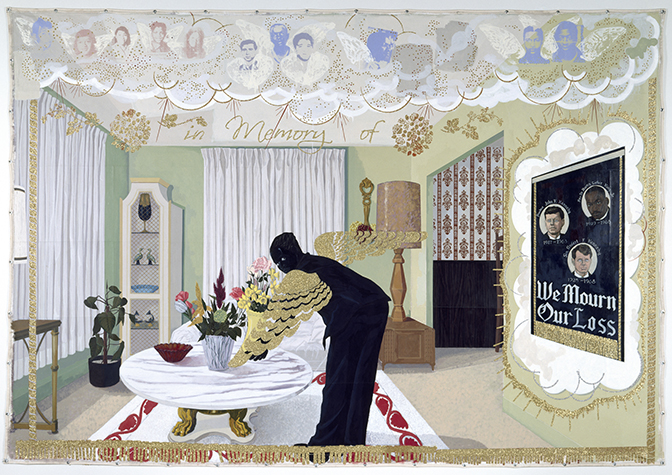
Kerry James Marshall, Souvenir I, 1997. Collection Museum of Contemporary Art Chicago, Bernice and Kenneth Newberger Fund. © 1997 Kerry James Marshall. Photo: Joe Ziolkowski, © MCA Chicago.
Marshall has continued to develop his aesthetic voice throughout his career. There is an unfolding posing of complex questions that investigate what it means to see and be seen. In the large scale Untitled (Blot) paintings one is confronted with prodigious abstractions in the form of Rorschach-test blots. These technically astute works illustrate the ever expanding breadth of the artist’s abilities and thought process. At a youthful 60 years of age, Marshall demonstrates here his engagement and inquiry continues to evolve. Standing in front of these works I felt a sense of wonderment when considering the trajectory of Marshall’s journey. So foreign yet familiar, I’m confident stating that anyone who visits this exhibition will certainly locate common ground and a rewarding dialogue with the artist.
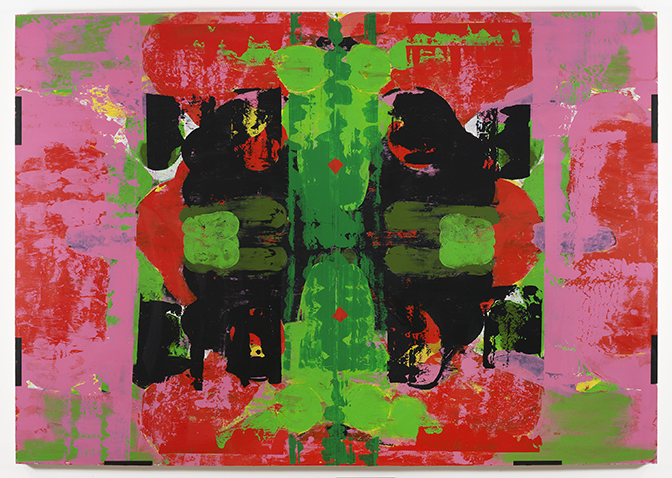
Kerry James Marshall, Untitled (Blot), 2014. Rennie Collection, Vancouver, Canada.
Image courtesy of the artist and David Zwirner, London.
Additional views of Kerry James Marshall: Mastry at the MCA Chicago:
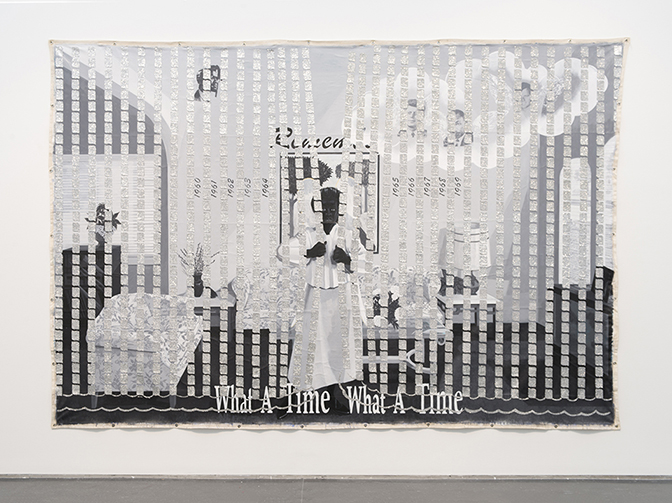
Installation view, Kerry James Marshall: Mastry, MCA Chicago, April 23–September 25, 2016. Work shown: Kerry James Marshall, Memento #5, 2003. The Nelson-Atkins Museum of Art, Kansas City, Missouri. Purchase: acquired through the generosity of the William T. Kemper Foundation – Commerce Bank, Trustee. Photo: Nathan Keay, © MCA Chicago.
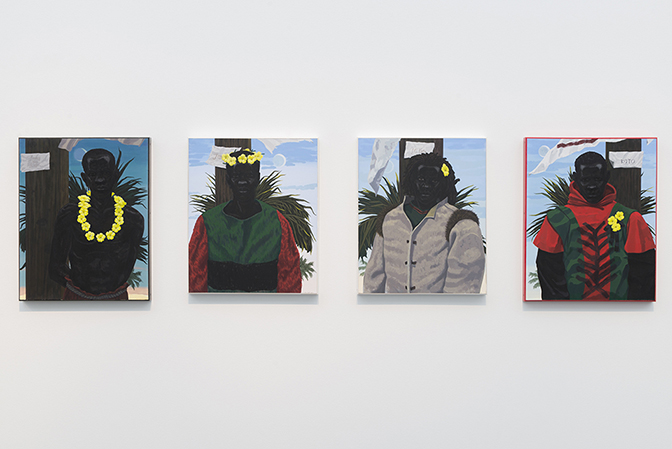
Installation view, Kerry James Marshall: Mastry, MCA Chicago, April 23–September 25, 2016.
Photo: Nathan Keay, © MCA Chicago.
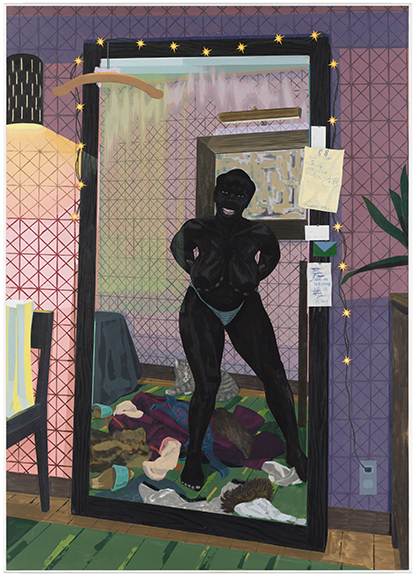
Kerry James Marshall, Untitled (Mirror Girl), 2014. Collection Museum of Contemporary Art Chicago, gift of Marshall Field’s by exchange.
Photo: Nathan Keay, © MCA Chicago.
For additional information on this exhibition and the artwork of Kerry James Marshall, please visit:
Kerry James Marshall: Mastry @ MCA Chicago – https://mcachicago.org/Exhibitions/2016/Kerry-James-Marshall
MCA Video Interview – https://exhibitions.mcachicago.org/kjm/video.html
Metropolitan Museum of Art New York – http://www.metmuseum.org/press/exhibitions/2016/kerry-james-marshall
Chicago Now – http://www.chicagonow.com/show-me-chicago/2016/04/kerry-james-marshall-mastry-at-the-mca-chicago/
Chicago Tribune – http://www.chicagotribune.com/entertainment/museums/ct-kerry-james-marshall-mca-20160404-story.html
Bad at Sports – http://badatsports.com/2016/review-mastry-kerry-james-marshall/
Review by Chester Alamo-Costello


